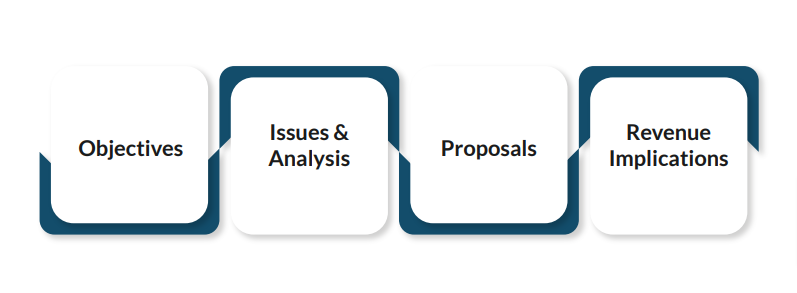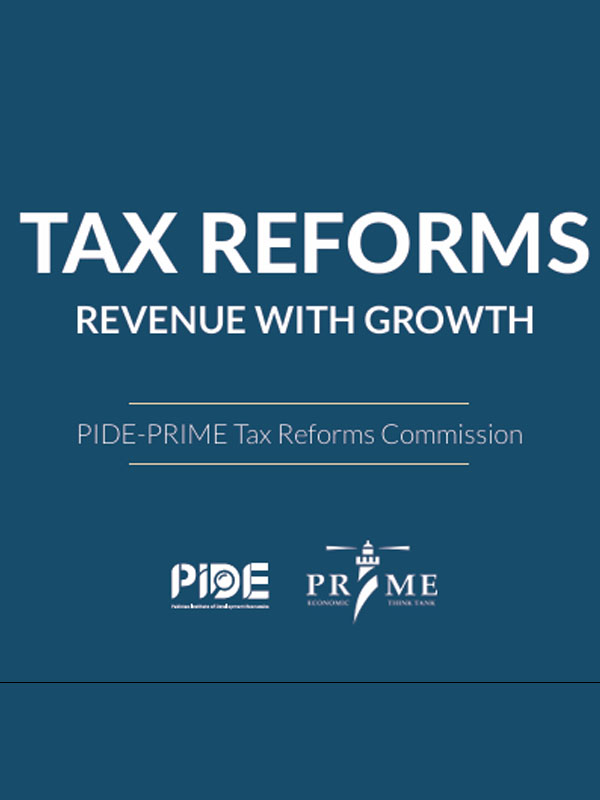
Pakistan Institute of Development Economics
- Home
Our Portals
MenuMenuMenuMenuMenuMenuMenu - ResearchMenuMenuMenuMenuMenuMenuMenu
- Discourse
- The PDR
- Our Researchers
- Academics
- Degree Verification
- Thesis Portal
- Our Portals
Tax Reforms Revenue With Growth
Publication Year : 2024
Table of Contents
- The Narrative and Approach Need to Change
- Issues and Analysis
- What We Propose proposals and Revenue Implications
- Customs and Tariffs The Need For an Open Economy
- General Sales Tax
- Income Tax Simplified and low tax regime
- Corporate Income Tax
- Federal Excise Duty (FED) Sin tax to Discourage Consumption
- Withholding Income Tax
- Perennial Problem of Exemptions
- Encourage Capital Formation
- Agriculture Income Tax
- Digitization is a Must
- Revenue Implications
Vision
Transforming Pakistan’s Tax System for Growth and Ease of Tax payers
This presentation is based on the reports published by the following institutions and individuals.
- Pakistan Institute of Development Economics (PIDE)
- Policy Research Institute of Market Economy (PRIME)
- Pakistan Business Council (PBC)
- Dr. Hafiz Pasha
The Narrative and Approach Need to Change
Stable and Predictable Tax Regime
- Investment requires a stable and predictable tax regime
- Unpredictable tax regime scared away investment due to:
- Complexities in tax code
- Random tax measures/minibudgets
- Annual tax dramas in the form of budgets – revised many times during a fiscal year
- Predatory annual budget recommendations – finance bill circus is harmful to transactions and
investment
Current narrative: it is the people, but the actual position is that it is the policy
- Pakistan has been struggling with its tax system since independence because expenditures
have exploded to meet- Predatory state machinery (perks and privileges)
- Global agendas – many of which should wait for a later stage of development
- Poor Public Financial Management
- The assumption that Pakistanis are tax thieves needs to change
- Poor policies, ineptitude and misgovernance are the culprits
Current narrative: look at our stage of development and governance
- International comparisons of the tax/GDP ratio should not set the objective
- At a similar stage of economic development, the US had a tax GDP ratio of 5-7 % and the UK
had around 12%
- At a similar stage of economic development, the US had a tax GDP ratio of 5-7 % and the UK
- Across countries issues related to systems/institutions/structures are not similar
Current narrative: international agencies need more local engagement
- International agencies require taxes to meet their foreign agendas rather than deal with the growing
expenditure issues- Have a limited idea of curbing the country’s expenditure needs
- Our tax policy on the advice of international agencies is raising taxes/import duties which stops global
integration - Perception of rent-seeking in tax administration, government waste, and corruption are often cited
as reasons for tax avoidance - A significant portion of legal economic activity stays informal to avoid intrusive and punitive taxes
Structure of The Report

Objectives and Parameters of A New Tax Policy
- A citizen-friendly, transparent, stable, and predictable tax regime to stimulate growth and investment
- Simplified & harmonized taxation to facilitate taxpayers and ease of paying taxes
- Automated & digitized administration to eliminate the direct interface between the taxpayer and the
tax authority
Summary & Key Points
Income Tax
- Uniform tax regime for all sources of personal and non-corporate incomes
- Decrease corporate tax rate to 25%
- Withdrawal of deemed rental income tax, CVT, super tax, turnover tax, presumptive/final tax
- Restore investment credits for plant and machinery
Customs Tariffs
- Zero-rated import of plant and machinery, industrial raw materials, and intermediate goods
- Withdraw regulatory and additional customs duties and withholding of income tax on imports
General Sales Tax
- Harmonised GST/VAT
- Gradual reduction of VAT to 10%
Withholding Taxes
- Reduction in the number of Withholding Taxes and complete roll-back of WHT regime except,
in the long-run, on pay-roll, interest, dividends and payments to non-residents
Tax Administration
- Mandatory registration in GST starting in the first phase with commercial importers, wholesalers and tier-1 retailers
- Automation and Digitization to reduce interaction between taxpayers and tax authorities
- Abolishment of non-filer category
- Enhancement in capacity of PRAL
- Formation of a Pakistan Fiscal Policy Institute/Budget Office for Parliamentarians
© 2024 Pakistan Institute of Development Economics



